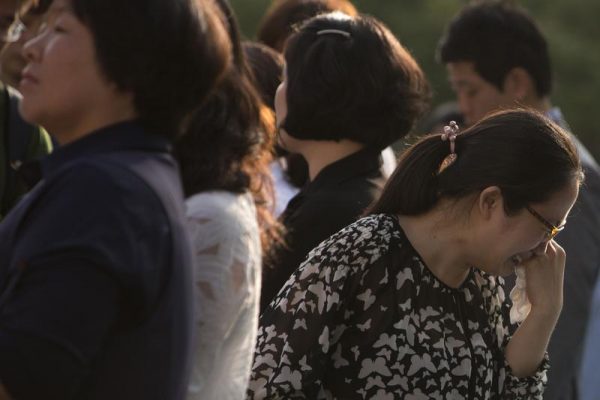Prolonging the anger and pain of the families is a lack of facts on the incident. Kim Young-oh, the father of a victim, was hospitalised on Friday, having fasted for 40 days to pressure lawmakers and the President to help him understand the truth of why his daughter died. Trials of the crewmembers and the National Assembly’s public hearing sessions have not revealed adequate information. Government transparency has been criticised because of the lack of crucial information about the disaster being made available to the public by involved and responsible agencies, and by attempts by the Park administration to divert the public’s attention to a man-hunt for the ship’s owner.
Dejected by incompetent, dogged bureaucrats and politicians, families of the victims are demanding a special law that would establish a special panel to investigate the incident with the legal power to subpoena information and indict suspects. Families of the victims are also requesting the right to recommend half of the sixteen members of the investigative panel. This is in contrast to the alternative of establishing a special panel with a President-appointed prosecutor, which historically has tended to fail in subjecting relevant government authorities to investigation.
Legal and criminal experts have argued that investigative and indictment powers as argued for by the families are necessary to fully uncover the causes of the disaster. In past cases of truth-finding commissions, the absence of the panels’ right to subpoena information and the right to indict suspects have been major stumbling blocks to putting uncooperative government bodies under investigation.
The main obstacle to the enactment of the special law has been the ruling Saenuri Party — the party claims that giving the investigative panel such powers would ‘shake’ the country’s legal establishment. The ruling party’s opposition to the enactment of the law reveals how little progress South Korea has made in subjecting government power to legal accountability. In response, 229 legal scholars and the Lawyers’ Association each issued a public statement endorsing the special law.
The opposition party, New Politics Alliance for Democracy, has also been ineffective in negotiating for the demands of the families. Agreements reached this week between the ruling and the opposition party on forming a special prosecutor panel with rights to appoint members of the panel distributed among the ruling party (5), the opposition party (5), civil society organisations (4) and families (3), have been rejected by the family representatives. The situation demonstrates a continued problem in South Korea’s democracy — a lack of advancement in the political parties’ role as channels for the demands of citizens.
An active civil society voicing society’s demands is filling the void left by political parties. The vigilance of voluntary citizens’ groups has been the strength of South Korea’s democracy. This time, the grieving families of the victims have actively taken up this role, pushing for social and legal change. The scale of public support is also unprecedented. More public figures as well as ordinary citizens have joined in fasting. And alternative media sources are ever more active in channelling information and shaping the public debate. Citizens hope that civil society’s continued engagement with and pressure on political parties may discipline the parties in the long term and increase the accountability of government power to civil society. Yet lawmakers have continued to remain unyielding. This will further the Korean public’s high sense of mistrust of politicians, the government and the President.
On 16 August Pope Francis visited South Korea, wearing a yellow ribbon as a symbol of the Sewol ferry tragedy. The Pope met with the victims’ families and baptised a father of a victim. He stood on the side of the wounded, and for this symbolic significance he was greeted with much enthusiasm. Standing on the side of the oppressed and challenging the powerful has always been a key driving force for change in South Korean society and politics. And it will continue to be the case in the future.
Eun Jeung Soh is Post-Doctoral Fellow at the College of Asia and the Pacific, The Australian National University.

